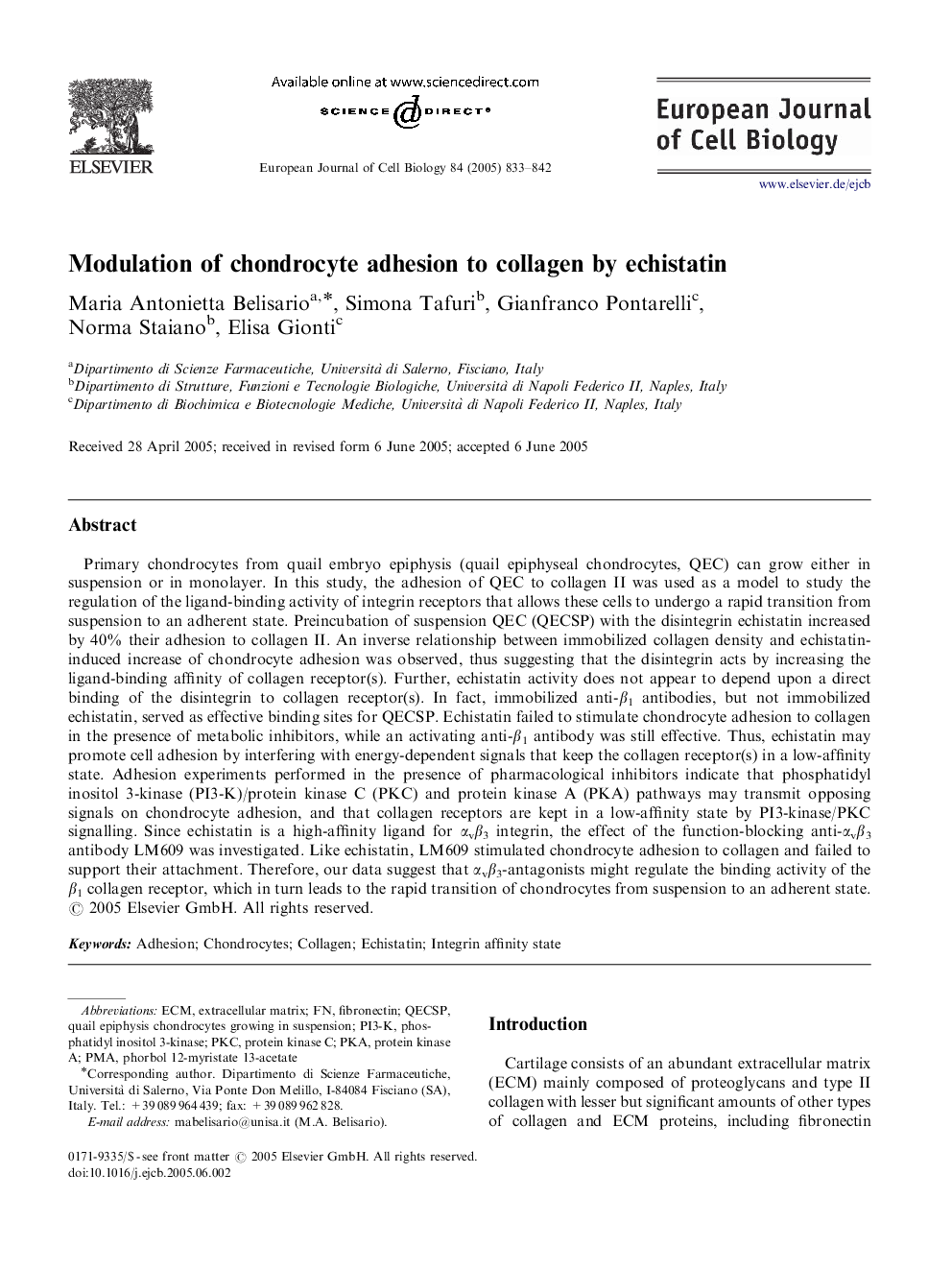| کد مقاله | کد نشریه | سال انتشار | مقاله انگلیسی | نسخه تمام متن |
|---|---|---|---|---|
| 9912414 | 1549781 | 2005 | 10 صفحه PDF | دانلود رایگان |
عنوان انگلیسی مقاله ISI
Modulation of chondrocyte adhesion to collagen by echistatin
دانلود مقاله + سفارش ترجمه
دانلود مقاله ISI انگلیسی
رایگان برای ایرانیان
کلمات کلیدی
ECMpKaPKCPI3-Kphorbol 12-myristate 13-acetateEchistatinPMA - LDC هاPhosphatidyl Inositol 3-kinase - فسفاتیدیل آنزیم 3-کینازFibronectin - فیبرونکتینExtracellular matrix - ماتریکس خارج سلولیprotein kinase A - پروتئین کیناز AProtein kinase C - پروتئین کیناز سیAdhesion - چسبندگیCollagen - کلاژنChondrocytes - کندروسیت
موضوعات مرتبط
علوم زیستی و بیوفناوری
علوم کشاورزی و بیولوژیک
دانش گیاه شناسی
پیش نمایش صفحه اول مقاله

چکیده انگلیسی
Primary chondrocytes from quail embryo epiphysis (quail epiphyseal chondrocytes, QEC) can grow either in suspension or in monolayer. In this study, the adhesion of QEC to collagen II was used as a model to study the regulation of the ligand-binding activity of integrin receptors that allows these cells to undergo a rapid transition from suspension to an adherent state. Preincubation of suspension QEC (QECSP) with the disintegrin echistatin increased by 40% their adhesion to collagen II. An inverse relationship between immobilized collagen density and echistatin-induced increase of chondrocyte adhesion was observed, thus suggesting that the disintegrin acts by increasing the ligand-binding affinity of collagen receptor(s). Further, echistatin activity does not appear to depend upon a direct binding of the disintegrin to collagen receptor(s). In fact, immobilized anti-β1 antibodies, but not immobilized echistatin, served as effective binding sites for QECSP. Echistatin failed to stimulate chondrocyte adhesion to collagen in the presence of metabolic inhibitors, while an activating anti-β1 antibody was still effective. Thus, echistatin may promote cell adhesion by interfering with energy-dependent signals that keep the collagen receptor(s) in a low-affinity state. Adhesion experiments performed in the presence of pharmacological inhibitors indicate that phosphatidyl inositol 3-kinase (PI3-K)/protein kinase C (PKC) and protein kinase A (PKA) pathways may transmit opposing signals on chondrocyte adhesion, and that collagen receptors are kept in a low-affinity state by PI3-kinase/PKC signalling. Since echistatin is a high-affinity ligand for αvβ3 integrin, the effect of the function-blocking anti-αvβ3 antibody LM609 was investigated. Like echistatin, LM609 stimulated chondrocyte adhesion to collagen and failed to support their attachment. Therefore, our data suggest that αvβ3-antagonists might regulate the binding activity of the β1 collagen receptor, which in turn leads to the rapid transition of chondrocytes from suspension to an adherent state.
ناشر
Database: Elsevier - ScienceDirect (ساینس دایرکت)
Journal: European Journal of Cell Biology - Volume 84, Issue 10, 19 October 2005, Pages 833-842
Journal: European Journal of Cell Biology - Volume 84, Issue 10, 19 October 2005, Pages 833-842
نویسندگان
Maria Antonietta Belisario, Simona Tafuri, Gianfranco Pontarelli, Norma Staiano, Elisa Gionti,